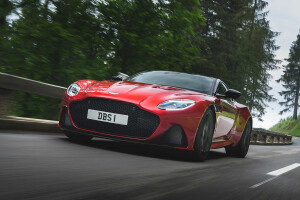Latest Review
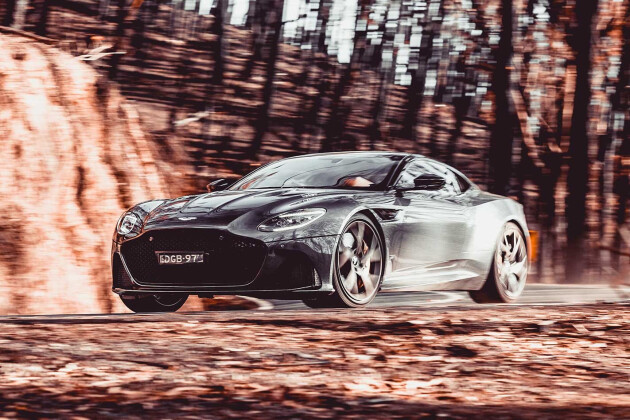
2019 Aston Martin DBS Superleggera | MOTOR feature review
Blistering acceleration and smokin’ styling sum up Aston Martin’s new 533kW twin-turbo V12 ‘super GT’
Victoria's Reefton Spur road is looking very different. An epic conflagration has reduced it to an almost duo-chromatic scene – black/grey and the copper red of crunchy-dry leaves of ghostly eucalypts.
There is an eerie lack of bird calls and caws in this deathly quiet forest. Pulled over onto blackened dirt beside the road and with little other traffic on a weekday when we do our shoot, loud sounds – uninterrupted by the usual dense foliage – echo off the trees as if you’re in a large auditorium. It’s surreal.
Following the hottest summer on record in Victoria, it was the hottest start to autumn in 30 years, and the inferno swept through here in early March, a fairly isolated bushfire incinerating a rectangular patch approximately 10km long and 5km wide, with Reefton Spur running roughly north-south up the middle. It is now newly reopened after post-fire repairs.
Reefton Spur is 100km, or about two hours, north-east of Melbourne at what is like the coccyx of the Great Dividing Range. Sixty snaking kilometres of bitumen connects Marysville to Warburton and there’s apparently one 18km stretch containing 165 bends.
For interstate readers, this old gold rush route could be called Victoria’s Putty Road, Gorge Road (maybe) or Mount Glorious. Far-flung and fond of motorcyclists who have left their brains in a drawer at home, in a car it’s undoubtedly one of the top 10 drives in Australia.
Never mind lightning strikes or arson (the two most common causes of bushfire), you could accuse us of having brought the Aston Martin DBS Superleggera here in early March and having started a fire with its styling alone.
Swooped back as if designed by Anemoi, the Greek god of wind, the DBS Superleggera sucks in your attention like fire does oxygen. Wide, low and with scandalously short overhangs, each wheel dares to push as far outwards as possible, passively contained by bulging, creased, muscular guards and hips. Some cars draw styling inspiration from fighter jets or predatory animals – for the DBS Superleggera, it’s what you’d find in the pages of FHM.
Aston Martin’s halo model until the supernatural-sounding Valhalla and Valkyrie arrive, the DBS Superleggera is basically a restyled DB11 with more grunt. There’s stiffer suspension and wider tracks too, but it’s a totally restyled exterior that reduces drag and increases downforce, and makes extensive use of carbonfibre to save weight.
The car resurrects two famous names in Aston Martin history, those being DBS – a badge first seen in 1967 – and Superleggera, a nod to the historic ‘super-lightweight’ construction technology of the famous Italian coachbuilder of the same name. One that helped reduce weight and whose scripted badge adorned the bonnets of cars like DB4, DB5 and DB6 Mark 1.
Using the DB11’s still fairly new riveted and adhesive-bonded aluminium architecture that shifts the emphasis from extrusions (of the previous VH platform) to stampings, the Superleggera’s suspension is double-wishbone front and multi-link at the rear. Its new carbonfibre exterior panels help reduce weight by 72kg to 1693kg (dry).
Under the enormous one-piece carbonfibre clamshell bonnet, the DBS utilises the same all-aluminium 5.2-litre Aston Martin-developed AE31 twin-turbo V12 first produced in 2016 and made in Aston’s own engine plant in Cologne, Germany.
Power has increased to an awesome 533kW and 900Nm, just through software and more boost (rather than bigger turbos or any other mechanical change). This is sent, gleefully, to the rear wheels only via a rear-mounted, brand-new eight-speed ZF torque-converter automatic transaxle and mechanical limited slip diff.
Forged 21-inch rear wheels measuring 11.5 inches wide, and with 305-section Pirelli P-Zeros, do their best to get the DBS Superleggera from rest to 100km/h in 3.4sec, 0-160km/h in 6.4sec, and on to a top speed of 339km/h. It’s at this v-max a double rear diffusor and ducted ‘Aeroblade II’ rear spoiler is said to produce 180kg of stability-enhancing downforce – the most of any production Aston Martin road car.
Hidden around its exterior are numerous, delightful aerodynamic details – fins, blades, channels, ducts and openings, all managing fast-moving air – that give you the impression the aerodynamicists carried a lot of clout in the styling meetings for this car.
It’s physically quite an imposing car, too. It’s nearly five metres long and more than two metres wide, though just 1280mm tall. As you pull on one of the thin, delicate, recessed doorhandles and open a long ‘swan wing’ door, the strongest whiff of leather hits your nose.
In this car, if it isn’t carpet or beautiful black ‘forged’ carbonfibre, it’s the highly processed skin of some unfortunate cow. In fact, there can’t be many other car interiors with as much leather as this one – and of the highest-feeling, handmade quality, so beautifully soft you can’t stop running your hands over it.
You sit low and rearward, looking over an expansive bonnet and at chiselled rear hips through antennae-like side mirrors almost above eye level (for me anyway). Familiar Mercedes switchgear is peppered throughout, but mostly you’re distracted by that curious squared-off steering wheel.
The crystal starter button right in the middle of the dash throbs red as you hit it, activating a high-pitched starter motor that sounds like it’s spinning at 1000rpm before that V12 growls meanly and loudly with revs like some predatory animal awakening in its lair.
It’s a sublimely comfortable car around town, the engine and transmission smooth, lazy and effortless, the ride supple and long-stroke over big bumps, if at times with a little edge from those low-profile tyres.
Catching your reflection in windows while driving the DBS Superleggera is a thrill that never gets old. Of course, its ability to turn heads and drop jaws is up there with the best of them – but compared to something like a gaudy, bright green Aventador, the DBS is a car in which you kind of want to be seen.
Not that there are many people or reflective surfaces out here. For 50 million years bushfires have influenced the evolution of flora in Australia to the point that we have a tree basically oozing highly flammable oil – one we export en-masse to places like Portugal and California – and plants that need to burn in order to bring forth their spawn.
Lighting the afterburners on the DBS Superleggera is one way to remove eyebrows if not careful. Of all its abilities, it’s the big Aston’s acceleration that leaves the greatest impression.
There’s not much top-end drama to the V12 – in fact, for noise and power, there’s little reason to go over 6000rpm to the 7000rpm redline. This engine is instead a torque factory, and the way it pins you and your startled passenger in the seats feels to be knocking on the door of the same accelerative league as Porsche 911 GT2 RS and McLaren 720S.
Pin the throttle and stunning turbocharged oomph arrives after a brief pause, thumping from low in the revs and motivating the DBS courtesy of strong traction, though wheelspin is very possible in the first three gears with the electronic nannies on leave.
It’s the outcome it delivers, rather than the engine itself, that you remember later. Relying on its turbochargers to supply most of the urge, the V12 lazily purrs and growls in the lower revs – with some hilariously theatrical overrun crackling – rather than howling towards some sky-scraping redline. The ZF eight-speed torque-converter auto, meanwhile, is a comfort-focused unit that’s fast up the gears if a little relaxed back down them. It does the job.
In the handling department, the DBS Superleggera has a lot of ability, if not anywhere near the magic of the best-handling sportscars, and it’s in this regard it surprises the most. On anything but a fast, flowing road, it just feels too big. There’s plenty of lateral grip from the bespoke Pirellis, inviting you to carry more and more speed into corners, and the damping is impressive even in Sport and Sport Plus modes.
But concentration is needed to place the wide front end as you step the commitment levels up, a task not helped by steering that feels overly darty, as if to artificially imbue the long-wheelbase DBS with an agility it kind of doesn’t have.
When needing to drive precisely, there’s a higher degree of guesswork than you’d like because there isn’t much steering feel either. It robs the big DBS Superleggera of some fun, and makes you want to wind things back a bit and simply enjoy the torque and noise of the V12 at a more relaxed pace. Perhaps Aston Martin should hit up its Mercedes-AMG colleagues for a rear-steering system.
At the end of the road, as you start to form the bigger picture, you are left with the impression the DBS Superleggera is the world’s most portable sculpture, a piece of automotive art timeless enough that people will still be ogling it in decades to come.
It has huge turbocharged torque, stunning long-distance ability and a V12 exhaust note smooth as honey – even if the handling feels as if it was the last thing they did on the car. A narrower DB11 AMR feels playful, light on its feet and athletic by comparison, more the driver’s choice. It also sounds better and louder, and it’s a fair bit cheaper.
But you wouldn’t have to seriously consider putting that car in a sealed section of your car magazine. Nor requesting an escort from the Country Fire Authority, as the DBS Superleggera threatens to bring new meaning to the term burning down your favourite road.
FAST FACTS
2019 Aston Martin DBS Superleggera
BODY: 2-door, 2+2 seat coupe
DRIVE: rear-wheel
ENGINE: 5204cc V12, DOHC, 48v, twin-turbocharged
BORE/STROKE: 89.0 x 69.7mm
COMPRESSION: 9.3:1
POWER: 533kW @ 6500rpm
TORQUE: 900Nm @ 1800-5000rpm
WEIGHT: 1693kg (dry)
POWER-TO- WEIGHT: 315kW/tonne
TRANSMISSION: 8-speed automatic
SUSPENSION: double A-arms, coil springs, adaptive dampers, anti-roll bar (f); multi-links, coil springs, adaptive dampers, anti-roll bar (r)
L/W/h: 4712/2146/1280mm
WHEELBASE: 2805mm
TRACKS: 1665/1645mm (f/r)
STEERING: electrically assisted rack-and-pinion
BRAKES: 410mm carbon-ceramic discs, 6-piston calipers (f); 360mm carbon-ceramic discs, 4-piston calipers (r)
WHEELS: 21.0 x 9.5-inch (f); 21.0 x 11.5-inch (r)
TYRES: Pirelli P Zero A7; 265/35 ZR21 (f), 305/30 ZR21 (r)
PRICE: $517,000
PROS: Can’t take your eyes off it; silky powertrain; batshit fast
CONS: Lacks handling talent of DB11 AMR; expensive
RATING: 4 out of 5 stars
News
-
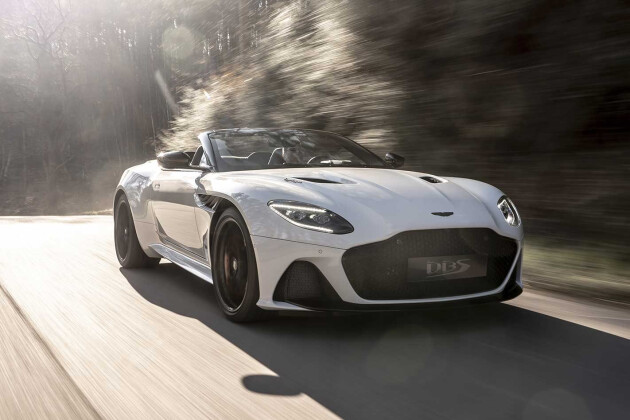 News
NewsAston Martin DBS Superleggera Volante pricing revealed
Aston lops roof off flagship GT without heavy performance penalties
-
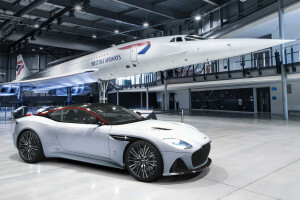 News
NewsSuper-rare Aston Martin DBS Superleggera Concorde unveiled
Only 10 of these jet-inspired Astons will exist
-
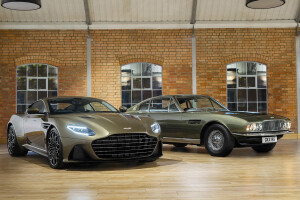 News
NewsAston Martin DBS Superleggera 'OHMSS' edition honours 1969 film
Super GT from Gaydon pays homage to the George Lazenby 007 film
-
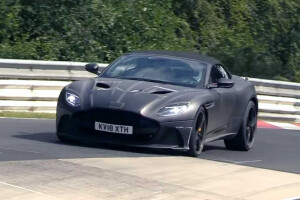 News
News2019 Aston Martin DBS Superleggera Volante testing: Video
Drop-top ‘Super GT’ has been testing on roads and at the Nordschleife
-
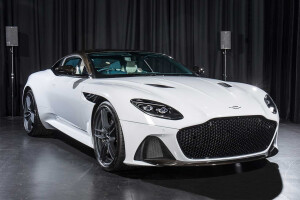
2019 Aston Martin DBS Superleggera revealed


